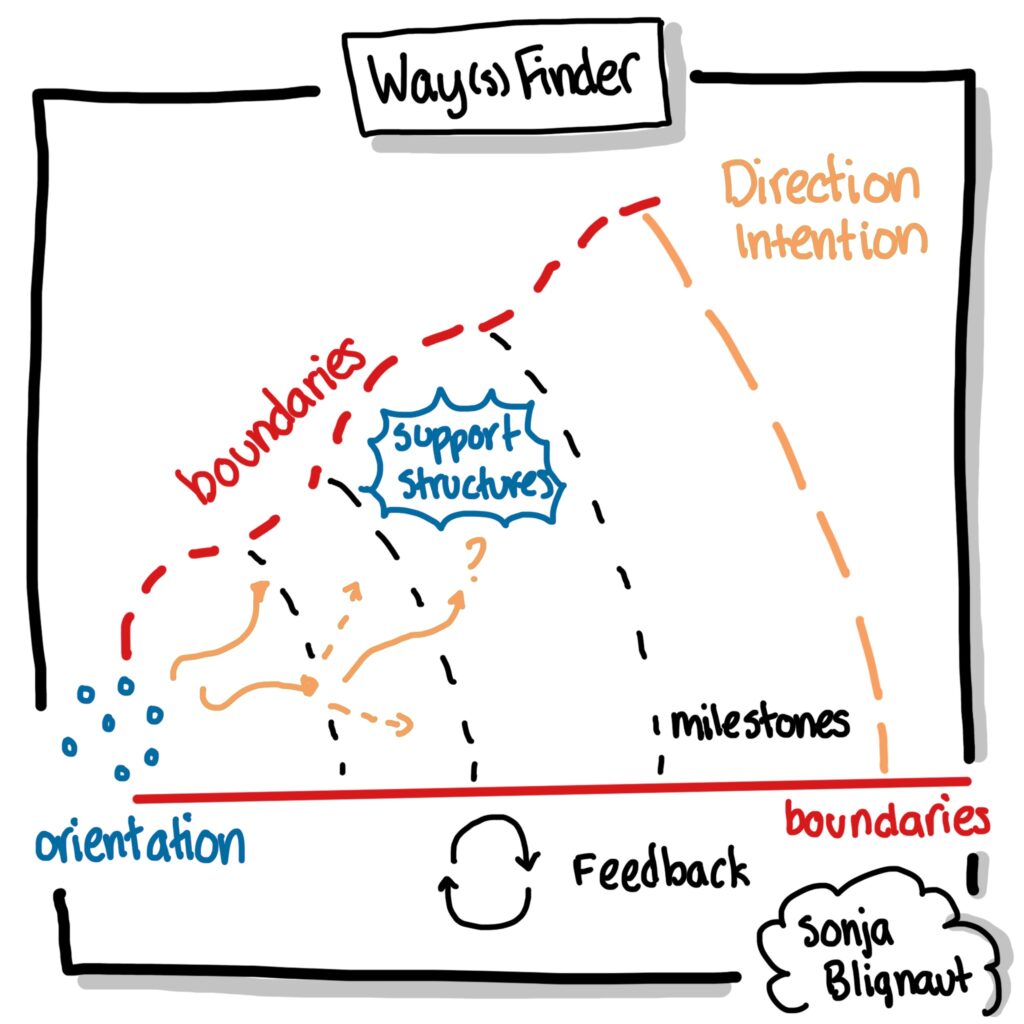Waysfinding – A Practical Approach for Navigating Complexity (Online) November 12
NOTE: THIS COURSE I SMOVE TO NOV 11TH
The environments in which we work and lead are becoming more complex. Keeping up with all the disruption and change is becoming more challenging. Many feel overwhelmed by competing priorities. Here are a few examples of things we’ve seen in our clients.
- Cargo cult Agile:
When Agile emerged, it held a lot of promise. Yet, 20+ years later, despite the emergence of an overwhelming number of tools and methods, very few companies are truly agile, and some ask if Agile is dead. Agile aims to improve leadership and organization in dynamic, complex, fast-changing environments. Yet many seem stuck in endless loops of installing the latest methodology. Different approaches suit different contexts, but allowing this diversity seems to create an unmanageable mess. How do we unlock the true promise of Agile? - The tension between alignment and innovation:
Managing and leading used to mean telling others what to do. Alignment was enforced by command & control or coercion. This undermines agency, autonomy, creativity and diversity – all critical in today’s complexity. How do we manage and lead without telling? How do we enable bounded autonomy so that we can remain coherent and explore without fragmenting? How do we create sufficient clarity so people feel safe enough to explore and solve problems without setting oversimplistic goals or telling people what to do? Complexity invites exploration. However, when teams are exploring autonomously, it can create a misalignment. It is a significant leadership challenge to step in and provide direction without destroying autonomy
and creativity. - “Faux” empowerment:
Many leaders have been told to “provide the WHAT and leave the HOW to their teams”. Yet, this is often too simplistic and leads to a kind of “faux empowerment” where innovation and creativity are stifled. True empowerment comes from setting a broad intent and giving problems to teams to solve, not just delegating the “how”. Yet how do we do this effectively without losing coherence and management oversight? - Minimal viable bureaucracy
Small, successful start-ups struggle with how to scale without becoming a rigid bureaucracy. The opposite is true in large corporates – how do we release bureaucratic complexity without losing our way? - Overwhelm and stress:
Individuals on all levels in organizations feel overwhelmed by competing demands. Prioritizing work to enable productivity AND well-being is becoming more demanding. How do we find our way through the morass of things screaming for our attention?
Navigating these unknowns is challenging, especially when we are expected to “know”. When we realize we are all wayfinders, i.e., we can no longer “know before we go”; we can only “know as we go.” it becomes easier.
Join us for a learning journey where we will explore the Waysfinder framework. A practical tool for sufficient clarity around critical boundaries and direction to enable safe exploration and help you and your team or organization get unstuck.
In this workshop, you will learn how to be more effective in complexity and how to apply Sonja’s Waysfinder framework to:
- Set direction and intent vs narrow goals to allow for necessary flexibility.
- Create exploration spaces where teams can have autonomy within boundaries (or guardrails).
- Prioritize and create focus without losing your innovative edge.
- Unleash the creativity and discretionary effort of your people.
- Practice wayfinding skills like situational assessment, experimenting with adjacent possibilities, noticing patterns, and continuous learning.
- Create the necessary feedback loops to ensure that you remain coherent with your strategy AND responsive to your environment.

We will explore what we can learn from:
- Wayfinding cultures like the Polynesians
- Anthropologists, sports coaches, and architects
- The field of complexity.
- Companies that use adaptive strategies, new ways to manage product portfolios, road maps, and performance measures.
Learning objectives of the workshop include:
- Explore the implications/differences of leading in complexity vs order.
- Understand the adaptive process and the tensions it creates in organizations.
- Explore Wayfinding principles and the Waysfinder framework.
- Learn how to lead by managing constraints and affordances.
- Explore the skills and resources you need to become a wayfinding organization.
This workshop is for you if any of the following is true for you …
- You recognize any of the challenges we described above.
- You are in a leadership or management role.
- You are responsible for managing change in your organization and need to understand complex change.
- You are an Agile coach or are accountable for guiding self-organizing teams towards a common direction and mission.
- You run a successful start-up that needs to scale without becoming a rigid and slow bureaucracy.
- You want to enable innovative cultures, not an innovation department.